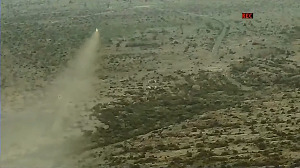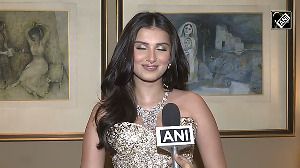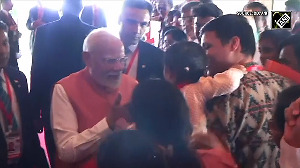 How will the return of a majority government at the Centre, the new India-US friendship and the Mangalyaan triumph change India?
How will the return of a majority government at the Centre, the new India-US friendship and the Mangalyaan triumph change India?
Colonel Anil A Athale (retd) has the answers.
From the national security perspective and its long-term effect, three events changed India in 2014:
- A return of a majority government and the end of the coalition era at the Centre.
- First steps towards India-US rapprochement.
- India's spectacular success in sending a probe to Mars, the Mangalyaan.
Image: India successfully placed its spacecraft in orbit around Mars, becoming the first country to succeed in such an inter-planetary mission at the first attempt, September 24, 2014.
In May when the electorate returned a decisive verdict in favour of the Narendra Modi-led Bharatiya Janata Party, it broke a 30-year jinx. While coalitions were a symptom of a divided polity, it also made for a weak executive.
It is not just that the major party was hamstrung in taking decisions in national interest, but the paralysis also led to other organs of the State, namely the judiciary and the fourth estate (media) assuming a disproportionate role in governance.
Just two three examples should suffice. Some years ago, the then Chief Justice of the Supreme Court made an extraordinary statement on terrorism and insurgency. Justice K G Balakrishnan at an international conference on human rights in New Delhi on December 13, 2008 stated he was against the concept of 'hot pursuit' of terrorists.
Here is a matter clearly in the jurisdiction of the defence ministry and the armed forces and is a strategic and tactical decision. Yet such has been the erosion of the power of the executive that the highest judicial official, un-elected and un-accountable to the people, could boldly intrude into the domain of the executive.
Two years ago, then prime minister Manmohan Singh visited neighbouring Bangladesh and signed a landmark deal on the swap of enclaves and water sharing. The chief minister of West Bengal sabotaged the agreement.
With this, India not only weakened a friendly Awami League regime in that country, but also forfeited the huge advantage that could come by gaining land access to the north-east through Bangladesh. This setback had long-term repercussions on security and consequent economic development of our vulnerable eastern flank.
The prime minister's authority was also eroded by the dual power centre syndrome with Congress President Sonia Gandhi and her National Advisory Council running a parallel government. It was not just that the NAC interfered with government policies, especially in the economic sphere, but Sonia Gandhi ensured that every single important appointment in government organisations was cleared by her.
Thus, all the important functionaries owed their loyalty not to the PM, but the party president. It is therefore no surprise that Manmohan Singh's government presented a picture of disarray.
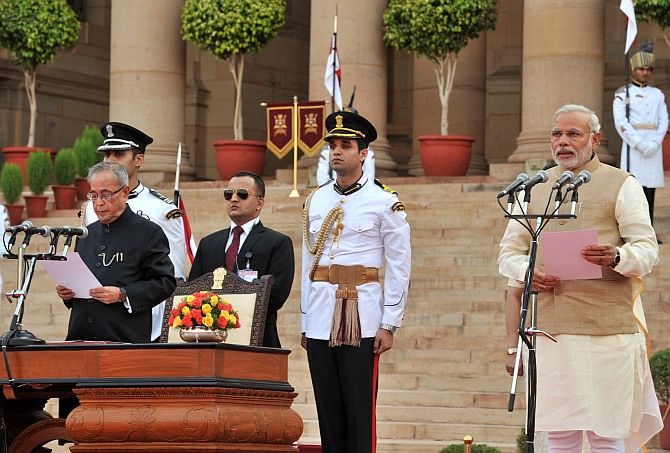
All that changed on May 16. Not only did a one single party get a clear majority and mandate to run the country, but by all accounts it was a mandate for Narendra Modi. Many of the newly-elected MPs owed their success to him.
Thus after 1984, we have a PM that has the power and authority to govern. There is, of course, the danger that the Rashtriya Swayamsevak Sangh may attempt to play the role that was so disastrously played by Sonia Gandhi. But if the past is to be any guide, then as in Gujarat, Modi may well show who is the boss.
Narendra Modi is sworn in as prime minister of India, May 26, 2014.
The first 'victim' of this change was Pakistan. It thought that it was business as usual and while willing to engage with Indian government it also continued to hobnob with Kashmiri separatists. The Modi government acted decisively and called off the talks.
Implementation of the stalled accord with Bangladesh is also on the cards. When future historians look at the events of 2014, they will surely rank this as a turning point for contemporary India.
The second event that has the potential to change Indian security scenario decisively is the hugely successful Modi visit to the US in September. His show at the Madison Square Garden in New York was a huge success and showed his clout in the Indian Diaspora in the US.
This was a shrewd move on Modi's part as the people of Indian origin have began to play a major role in the electoral outcome in the US. Is it any wonder that a group of US Congressmen/women graced this show. Having thus established his clout, Modi reached out to the US, setting aside his personal insults inflicted by a lobby of evangelists and assorted minority groups.
The jury is still out on how the US behaves post its withdrawal from Afghanistan. But if the eagerness with which President Obama accepted the invitation to be the chief guest at India's Republic Day event in 2015 shows that Modi has interested the US in close relations with India. I am no lover of the US, but realism demands that India accept the geo-political necessity of US help in facing up to the Chinese challenge.
Like in most of the 20th century when Indian interests coincided with that of the Soviet Union, in the 21st century, India-US national interests are likely to be parallel, if not convergent. It makes sense to befriend the US.
Seems that fearful of the backlash of its domestic 'vote bank's dislike of the US, the previous government was timid in moving in the right direction.
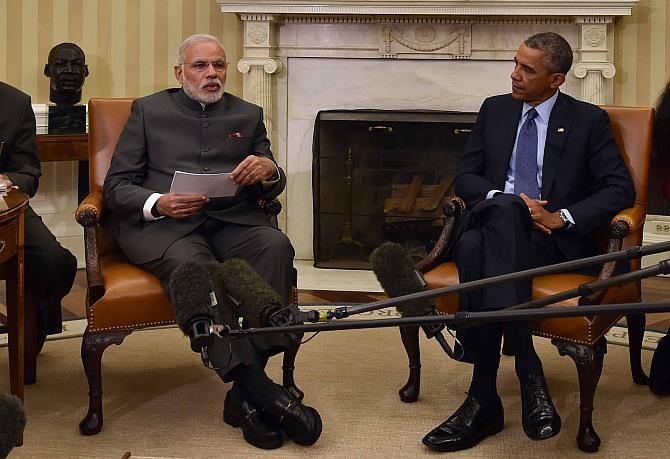 The Modi government's overtures to the US and willingness to play a role in Asia may well see a transformation in the Asian balance of power. It should not be forgotten that China owes much of its clout to the alliance with the US that lasted for 20 years since the 1972 Shanghai declaration.
The Modi government's overtures to the US and willingness to play a role in Asia may well see a transformation in the Asian balance of power. It should not be forgotten that China owes much of its clout to the alliance with the US that lasted for 20 years since the 1972 Shanghai declaration.
Image: Prime Minister Narendra Modi and President Barack Obama at the White House. Photograph: Paresh Gandhi/Rediff.com
The third and possibly most important event to have a major impact on the strategic balance is the success of the Indian space probe, the Mangalyan.
Not only is India the first country to be successful in its very first attempt to send a probe to Mars, but if has done so at a fraction of the cost of the US probe.
India has shown its mastery of low-cost technology. The success has major implications for the military field as well. The precision and skill shown by Indian scientists has direct impact on another exacting field -- missile defence.
It sent a remainder to the world that India has indeed a huge technical talent pool, not just at the Indian Institutes of Technology. In the past as well, while India tested a solid fuel rocket, the SLV-3 way back in 1980, China is to launch its first solid fuel rocket in 2016. The solid fuel missiles have an obvious military advantage and India has been way ahead of China in this field.
It seems that the Indian and Chinese space programmes are following the USSR-US space race. While the Soviets were ahead in big rockets (sent the first man to space), the Americans relied on smaller rockets and concentrated on precision. In the end, the US won the race to the moon.
Even in the nuclear field India is well ahead of China in reactor building. The noted nuclear scientist, the late Professor V G Bhide, once told me that reactor technology is far more difficult to master while nuclear explosive technology is child's play.
India need not be left behind in futuristic weapons given its twin advantage of refinement and cost effectiveness. All that is needed is a right push to innovation.
Taken together, these three events portend a strong and prosperous India in the 21st century.
Colonel Anil A Athale (retd) is Coordinator, Initiative for Peace and Disarmament.









